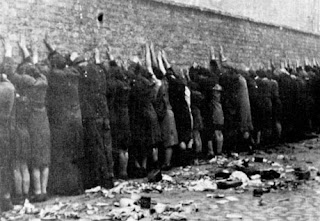
Jews rounded up by the Germans during or after The Warsaw Ghetto Uprising.
Joshua Stanton examines the genocides of our day:
Fifty years from now, schoolchildren will make solemn visits to memorials at Camp 22, and grad students will write theses about it. Yet today, while Camp 22’s next victims can still be saved, it’s another unpleasant topic we choose not to bring up for the sake of a diplomatic dance whose end result is mournfully predictable. The angst of those who should be talking about Camp 22 is wasted instead on places that aren’t remotely comparable to Tuol Sleng or Mauthausen, though too many would squander their credibility and betray their true motives by suggesting otherwise.
It’s also why you’ll never hear feel-good featherweights like George Clooney, Barack Obama, or Nancy Pelosi advocate any remotely plausible plan to prevent an undeniably likely genocide in Iraq. There is no feel-good, cost-free, plausible way to prevent that genocide or the other wars that will emerge from it, which puts the question beyond their competence and compassion. What they don’t realize is that it’s just as true of Darfur. We’ve been talking about Darfur for years now, and no nation or international body has yet taken a single effective step to stop the genocide there. This isn’t because we don’t know how. It’s because the things we could do to deter and mitigate this genocide quickly wouldn’t make enough of us feel good about ourselves. Yes, recruiting public support is often a prequisite to effective action, but if feel-good activism isn’t leading us toward effective action, it’s an exceedingly selfish form of compassion.
This is an exceptional writing.
Drumming in circles has its place.
But, it won’t stop genocide.
